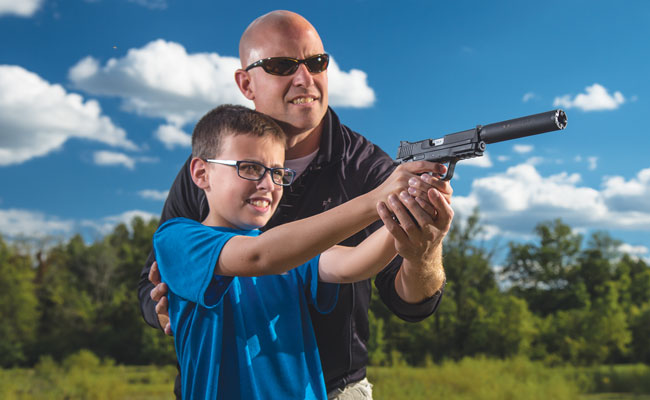
Suppressor magazine is focused on bringing you the latest and greatest in suppressor manufacturing, and to that end, we also care about your health. Yes, suppressing gunfire may increase accuracy and help maintain cover in a hunting or tactical situation, but it’s also protective of your hearing. Quality of life has many layers. No one can argue that hearing, or lack thereof, doesn’t affect our level of enjoyment.
Most shooters know the importance of “eyes and ears” on the range and in the field. We’re taught that on day one — a hot range means ear protection and eye protection is in place. And there’s a good reason for this: A gunshot typically has a noise rating of 160 decibels (dB) or above, which exceeds the Occupational Safety and Health Administration (OSHA) hearing-safe threshold of 140 dB.
“Repeated exposure to loud noises over a long period of time puts one at a higher risk for permanent hearing loss,” said Dr. Mary L. Schinkel, an Otorhinolaryngologist (Ear, Nose, Throat doctor) in Pekin, Illinois. “OSHA describes 140 dB as the threshold for pain, so not only is the 167 dB of a gunshot placing someone at a higher risk for hearing loss, it may result in physical pain.”
Dr. Schinkel also noted a trend of increased tinnitus associated with hearing loss in younger patients. “We used to attribute hearing loss and tinnitus to the elderly,” Schinkel said, “but now patients in their 30s and 40s present with similar symptoms.”
Using a suppressor can reduce a gunshot’s noise rating to as low as 120 dB, effectively extending the duration of time you can safely be exposed to elevated noise levels and minimizing potential physical discomfort. Continued use of ear protection reduces those noise levels even further. However, OSHA and the National Institute for Safety and Health (NIOSH) recommend no more than 15 minutes of exposure per day, even at this reduced level.
Shooting suppressed also dampens recoil and concussion, which is beneficial when we consider that “sound is transmitted not only through the air into the ear canal but throughout the body, so vibratory sound may also be harmful,” said Dr. Schinkel.
By lessening the noise level and reverberations created by gunfire, suppressors establish an overall healthier shooting environment.
When we asked Dr. Schinkel if suppressor usage might lower medical costs, she said it is difficult to isolate and quantify. “Protecting hearing would certainly improve quality of life,” she said, “and it would be difficult to associate a cost to such a thing.”
Dr. Schinkel has participated in target and clay pigeon shooting, and she recognizes that all sports carry a risk of injury. Suppressor usage is one layer of protection in the shooting sports.
“Wearing hearing protection while shooting is [another] example of how certain precautions are recommended to prevent or minimize the risk of such injury,” Dr. Schinkel said. “Our hearing is precious and, similar to so many things in our

